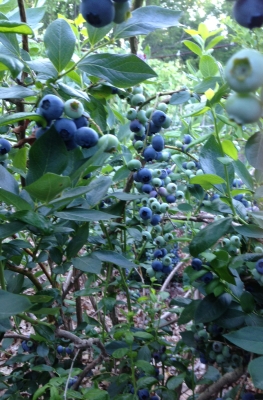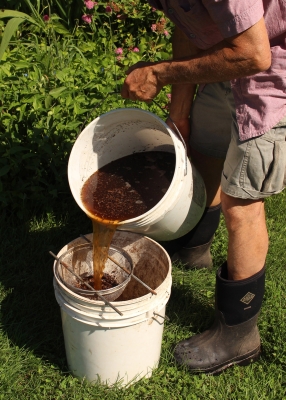BLUEBERRIES GALORE, COMPOST TEA REDUX
On My Knees for Blueberries
For the last few years, my blueberries have had a problem. Perhaps yours also. Rather than grow upright, the stems arch downward, some so drastically that they actually rest on the ground.
A few years ago, I pinned blame on the weather. Not that it was evident just how the weather could be responsible, but it’s always convenient, in gardening, to blame things on the weather. But this explanation is hardly convincing. Spring and summer weather have not been consistent enough over the years to be able point my finger at too much rain and/or not enough sunlight (the combination of which could lead to those bowing branches).
How about pruning or fertilization? Too much of either could promote lush growth that couldn’t support itself. Except that my pruning has been consistent over many years. And Dr. Marvin Pritts, berry specialist at Cornell, confirmed that he and others saw the same problem, without definitive explanation, a couple of years ago.
I like the green thumb explanation best: That is, that I’m such a good blueberry grower that the branches can hardly support the prodigious crops I’ve coaxed from them. So I’m not really complaining. Just curious. And having to get on my knees to harvest low hanging fruit.
Remember Fruit Flies?
There is one fly in the green thumb ointment. A fly, literately. A tiny fruit fly called the spotted wing drosophila or, quicker to say, which is necessary for this fly that’s getting a lot of buzz lately, SWD. The fly attacks many small fruit, starting the season with honeysuckle berries, then moving on to raspberries, blackberries, and . . . blueberries.
Most fruit flies lay their eggs in overripe, or at least ripe fruit. Not SWD. She lays her eggs in unripe fruit. The eggs are small and what hatches from them are small; their being “maggots” sort of takes the appeal from the berries.
SWD is a new pest, so new ways of thwarting them are being tried. Covering the plants with fine netting very early in the season is effective but would be very bothersome, for my planting, at least. Various organic sprays are another possibility: Entrust, which is derived from a soil bacterium, is effective if used STRICTLY according to directions; horticultural oil might prove effective. Traps are also under test.
One way to bypass the problem is to grow only earlier varieties of blueberries. SWD has not showed up here and at many other sites until early August. Plenty of varieties — Duke, Earliblue, Toro, and Blueray, for example — are finished before then.
But I want fresh blueberries on into September. Harvesting blueberries (or raspberries or other berries) and whisking them into a refrigerator at 34 degrees for 72 hours will kill eggs and larvae. Freezing, the destiny of about half our harvest, also kills the eggs and any hatched larvae. A little egg and meat boosts the protein content of the berries.
I Backpedal, Sort Of
It may be time for me to eat pie. Not blueberry pie, but humble pie. Regular readers of my words probably realize that I take a certain amount of pleasure in iconoclasm. And one recipient of my eye-rolling has been compost tea, something that many gardeners and farmers love to love even though there’s little theoretical or empirical support for its efficacy.
“Little” but not “none.” A number of peer-reviewed articles describe benefits from using NON-AERATED compost tea to thwart root diseases. (The relatively recent interest in compost tea is for AERATED compost tea, often sprayed on leaves. Aerated compost tea, the brainchild and business of Dr. Elaine Ingham, is compost tea that’s bubbled with air for en extended period, often with molasses or other additions. Generally, experiments have not supported touted benefits of aerated compost tea.)
For the past number of years, my pea crops have been failures, the plants yellowing and dying soon after harvest begins. Fusarium or some other root disease is the probable cause.
In desperation, five times this spring, at about weekly intervals, I put a shovelful of compost into a 5 gallon bucket and filled the bucket with water. After one day of steeping, the tea was strained, put it into a watering can, and drenched on the soil beneath of my thirty foot, double rows of peas.
Lo and behold: The peas look healthy and have been yielding good crops!
I won’t say for sure it was the compost tea or what in the tea, if it was the tea, did the trick. But nothing else jumps out this year as the savior of my peas. For a more definitive tea endorsement, next year I should grow a row or two without the tea, and a row or two with the tea. I might try that, although it presents the possibility of my ending up with a row or two of unproductive vines.
For now, I’ll just have humble pie. And tea.





I have heard about SWD through our master gardening extension here … but so far has not arrived this far North. We were told to be on the lookout. You are probably 5-6 hours South of me – that’s not enough distance as far as I’m concerned. I’ll be checking my raspberries closely! You have also reminded me to get out there and pick my blackberries! I will have to try some compost tea. My peas didn’t do well at all this year but usually do – I could blame it on the weather ha ha.
Five or 6 hours south of you?! I am in Zone 5, New York’s beautiful Hudson Valley.
I know where you are – very beautiful region – I went to college in New Paltz but didn’t know of you at the time. I am along the St. Lawrence River – see Canada across the way.
Hello, I’ve had a hard time finding the answer to a blueberry-related question and was hoping you could help – can a highbush pollinate a half-high? I have Northblue, Bluegold and Rubel, does this work?
On a separate fruit note, I’ve noticed you are a big fan of currants, and was wondering what you thought of green currants (Finnish-bred albino blackcurrants I think)?
Thanks very much! And thanks for all your great books and blog.
Highbush blueberries should be able to pollinate half-highs.
I’m not familiar with green currants? What do they taste like? Are they worth growing. Blackcurrants are among my favorite fruits, especially the variety Belaruskaja.
I’ve never tried green currants, I just heard about them from a friend who lives in Finland so wanted to try growing. I planted the variety Vertti and hope to find out what they taste like soon, although I’m afraid my location (Vienna, Austria, apparently zone 6 but maybe more like 7) might be a bit warmer than it likes. According to the institute that bred them they’re like blackcurrants but sweeter, https://portal.mtt.fi/portal/page/portal/mtt_en/mtt/facilities/FinE/FinEplants (scroll down)
Thanks for answering my blueberry question!
I’m going to see if I can get plants of Vertti.
Hi Mr. Reich – Thanks for sharing such a wealth of information! What types of blueberry bush grow best in containers? Would Reka or Northland work? Any other specific tips for blueberry container growing outside those you’ve written about on your blog (i.e., acidic soil, sun, plenty of water)? Thank you! Jody (zone 7a)
Pretty much any blueberry could be grown in a container. A larger growing variety would, of course, prefer to be allowed to grow large, which would require a larger container. Northland is a dwarfish variety, so better for containers. Reka is not small so, although the variety is good in other respects, you might be better off with a different variety such as Polaris or Northblue, both “half-high” varieties.
Hi Lee,
I’ve been reading about bio char and thinking about experimenting with making some and adding it to my compost to amend my Sandy soil. What are your thoughts on bio char?
See my blogposts https://leereich.com/2012/03/hot-off-press-my-new-book-fruit.html, https://leereich.com/2015/01/nothing-to-do-sequester-carbon.html
Hi Lee – just curious if this year you tried the experiment of only using tea on some of your peas to see if there was a difference.
Thank you –
Gayle
Not sure what you mean by “only tea.” But I did use compost tea on my peas — NOT aerated, just like last year. I didn’t leave any pea bed untreated so it’s hard to assess any effect but it seems (key word there) that there was some benefit. Next year, I’ll force myself to leave one bed untreated to better assess any effect of the tea.
Hi Mr. Lee. Did you do the experiment in 2017 for the peas? Half fed with compost tea and half not? Outcome?
No. I had a problem with sparrows nibbling at the seedlings so I covered all the peas with row cover, which made it too hard to apply the tea. I am planning to do the experiment this year though.
We are all waiting with abated breath on your experiment kind sir??
As so often happens in experiments, unforeseen things come into play. I’m still working on getting a definitive answer.
So there’s been some time past here. And I’m curious is there’s any updates on the test results?
There seems to be some merit it compost (not aerated) compost tea applications to the soil for this pea disease.